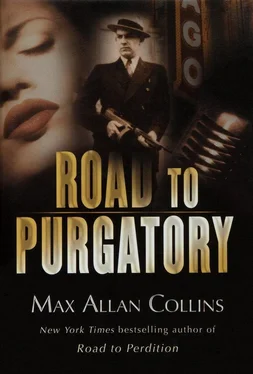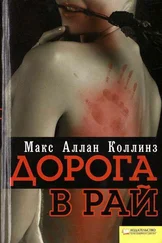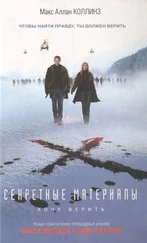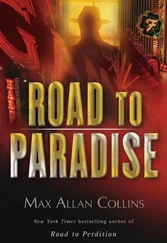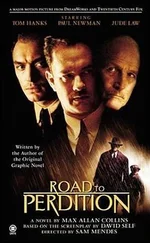“Harry,” O’Sullivan said, “it’s a damn shame a brave officer like Simmons there had to catch a stray bullet in this riot. He’ll deserve a commendation.”
The mayor’s chin was quivering. “You really think I’d cover for you, O’Sullivan?”
“Well, Harry, you best convince me such, right now — or both you and Randell can join Simmons in hell.”
The mayor whitened; then he lurched to one side and fell to his knees and vomited.
In a voice that tried to sound calm but had a warble in it, Randell said, “Harry’ll cover for you. If he doesn’t, I’ll kill him for you myself, Mike.”
“I believe you,” O’Sullivan said. Then to the mayor, he said, “Stand up, Harry.”
The smell in the enclosed space was awful.
Davis glanced over with his face balled up. “What the hell did you have for supper, Harry? Christ!”
The mayor got to his feet, looking less than dignified in his pissed pants and with puke-stubble around his mouth.
But doing his best, the mayor said, “It’s... it’s sad to lose a fine... fine man like Lieutenant Simmons to a... a... unruly mob.”
O’Sullivan nodded. “We’re in this together, Harry. You see, I’m doing you a favor.”
“A... a favor?”
“That’s right. That’s why Chief Cox paved the way for this.”
The mayor couldn’t hold back a sneer at word of this predictable betrayal.
“If those thousands rush this building,” O’Sullivan said, “and find out what you and your boyos did to John Looney... they’ll lynch you, sure.”
The mayor frowned in the realization of the truth of these words.
“ Both of you,” O’Sullivan said, throwing a glance at the surviving dick. “The way Simmons went out will start to look merciful.”
The mayor nodded.
His hands still up, Randell said, “You’re right, Mike. For God’s sake, get John outa here.”
Davis was looking through the open door into the outer office. “John’s ride is here,” he said.
“Okay,” he said to Davis. “Let’s you and me drunk-walk John out to the stretcher — no need for another witness to this tragedy... Harry, I’d advise dumping your boy on the street somewhere.”
The mayor swallowed and nodded.
Randell said, “I’ll handle it personally, Mike. Nobody but us here in this room will know.”
“That’s how I want it,” O’Sullivan said.
Looney’s two men, each with a gun in one hand, got on either side of their barely conscious boss and eased him to his limp feet.
From the doorway, as he hauled Looney in tandem with Davis, O’Sullivan glanced back with a tiny smile, and said, “Gents? If you do decide to cross me, make sure you kill me. You wouldn’t like bein’ on my bad side.”
Within moments, Looney was on a stretcher that a young uniformed cop and Davis were bearing down the stairs. The gunfire outside had resumed, but it remained limited to shots in the air and high assaults on the building itself — posturing, so far, not open warfare. O’Sullivan, in his topcoat again, the .45 still in hand, followed as they carted the now unconscious Looney through the empty station to the garage and into the waiting paddy wagon.
Davis rode with Looney, and O’Sullivan sat in front while the young copper drove the bulky black vehicle. The garage was around back, and away from the crowd, so getting out to open and close the door — a chore O’Sullivan handled — was no problem. Pushing through the crowd itself was slow, and rioters banged on the metal sides, making dull clangs; but nobody took a shot, and in five minutes they were clear of the riot scene.
Just before they slipped away, however, O’Sullivan spotted a familiar face at the rear of the crowd: Connor Looney, watching the Maria depart. The Old Man’s son was not one of those yelling or waving a gun... In fact, Connor looked eerily calm, a terrible smile glazed on his face.
No man on earth, Michael O’Sullivan decided, had a worse smile than Connor Looney... nor was there likely any man who wore a smile more often, at such inappropriate times.
“Where to?” the wide-eyed young cop behind the wheel asked.
“St. Anthony’s Hospital,” O’Sullivan said.
Unaware that his wife was already a patient there.
The riot outside city hall ended only when the police began to fire volley after volley into the mob.
How the coppers had held up so long was anybody’s guess — shots fired over their heads, bricks breaking windows, stones tossed their way. Such dangerous indignities could not forever be withstood.
But they did not fire spontaneously — they waited for Captain Doherty’s orders, which were to shoot to wound, and thanks to the captain’s caution, not one of the rioters was killed, although around twenty did go down bleeding. One malcontent climbed a pole and tried to cut an electric line, presumably to plunge the building into darkness, but a police shot picked him off, an arc light coming down with him, sputtering to the crowd in a shower of sparks.
Finally the mob dispersed, hauling away their casualties into the downtown. There they lingered, however, roaming and occasionally looting. But by dawn Market Square and the block between it and city hall were deserted, albeit resembling a battle field — spent shells, bricks, rocks, shards of glass, chunks of wood, strewn like ominous refuse.
The next morning, the governor — receiving a call not from Chief Cox but from the sheriff — declared martial law and six hundred militia from Galesburg, Monmouth, Sterling, and Geneseo poured in, mobilizing at the Rock Island Armory. Public speeches and meetings were forbidden — groups on the street could be no larger than two. For several days, these uniformed soldiers patrolled the streets with rifle in hand.
But this cavalry arrived after the fact, the rioters long gone. Schriver’s police raided speakeasies and bawdy houses, and thirty-four arrests were made. The opening gun of this “clean-up campaign” was closing down the Rock Island News on charges of “indecency,” with eighteen employees, mostly newsboys, arrested.
Mayor Schriver’s efforts to quell John Looney’s power of the press were, ironically, seriously undercut by the other Tri-Cities papers — even the archenemy Argus .
His face bruised and decorated with bandages, including one around his head that brought to mind the Spirit of ’76, John Looney — midmorning of the day after — held court in his hospital gown from his bed in a private room at St. Anthony’s, in the modern wing his money had largely made possible. His eyes almost swollen shut, the publisher of the Rock Island News clearly wasn’t faking.
An armed bodyguard, Emeal Davis, was posted outside the door; and at Looney’s bedside sat the patient’s son, Connor, solemn and dressed in black, as if his father had passed away (despite the man’s presence next to him). Already the place was filled with flowers; to Connor Looney, it was more like sitting in the winner’s circle at the Kentucky Derby than the sick room of a guy who just got the shit kicked out of him.
But Connor was impressed by the crowd his old man had drawn. In addition to the Argus , Moline Dispatch , and Davenport Democrat , reporters had come from as far away as the Register in Des Moines and the Trib in Chicago, driving through the night to get to the scene of a riot that would be reported ’round the world.
“I realize, gentlemen,” Looney said through bruised lips, his battered condition well-suited to his melodramatic tone, “that some of us have had our little differences.”
Differences like calling the editor of the Argus insane, in print, Connor thought, managing not to smile.
Читать дальше
